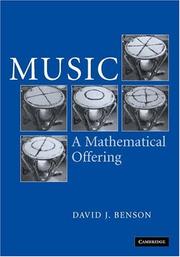| Listing 1 - 3 of 3 |
Sort by
|

ISBN: 9780521853873 0521853877 9780521619998 0521619998 9780511811722 9781139649254 1139649256 0511811721 9781139638791 1139638793 9781139641630 1139641638 1107165652 1107253837 1139637339 1299409229 1139648292 Year: 2011 Publisher: Cambridge: Cambridge university press,
Abstract | Keywords | Export | Availability | Bookmark
 Loading...
Loading...Choose an application
- Reference Manager
- EndNote
- RefWorks (Direct export to RefWorks)
Since the time of the Ancient Greeks, much has been written about the relation between mathematics and music: from harmony and number theory, to musical patterns and group theory. Benson provides a wealth of information here to enable the teacher, the student, or the interested amateur to understand, at varying levels of technicality, the real interplay between these two ancient disciplines. The story is long as well as broad and involves physics, biology, psycho acoustics, the history of science, and digital technology as well as, of course, mathematics and music. Starting with the structure of the human ear and its relationship with Fourier analysis, the story proceeds via the mathematics of musical instruments to the ideas of consonance and dissonance, and then to scales and temperaments. This is a must-have book if you want to know about the music of the spheres or digital music and many things in between.
Music --- Musical perception. --- Acoustics and physics. --- Mathematics. --- Musical perception --- Acoustics and physics --- Mathematics --- 78.86.1 --- Auditory perception --- Musical acoustics --- Physics --- Sound --- Monochord --- Psychological aspects --- Music theory --- Mathematical Sciences --- General and Others --- Music - Acoustics and physics --- Music - Mathematics
Book
ISBN: 3319722727 3319722719 Year: 2018 Publisher: Cham : Springer International Publishing : Imprint: Springer,
Abstract | Keywords | Export | Availability | Bookmark
 Loading...
Loading...Choose an application
- Reference Manager
- EndNote
- RefWorks (Direct export to RefWorks)
This book presents an overview of the emerging field of emotion in videogame soundtracking. The emotional impact of music has been well-documented, particularly when used to enhance the impact of a multimodal experience, such as combining images with audio as found in the videogames industry. Soundtracking videogames presents a unique challenge compared to traditional composition (for example film music) in that the narrative of gameplay is non-linear – Player dependent actions can change the narrative and thus the emotional characteristics required in the soundtrack. Historical approaches to emotion measurement, and the musical feature mapping and music selection that might be used in video game soundtracking are outlined, before a series of cutting edge examples are given. These examples include algorithmic composition techniques, automated emotion matching from biosensors, motion capture techniques, emotionally-targeted speech synthesis and signal processing, and automated repurposing of existing music (for example from a players own library). The book concludes with some possibilities for the future.
User interfaces (Computer systems) --- Computer science. --- Music. --- User interfaces (Computer systems). --- Multimedia systems. --- Mathematics. --- Computer Science. --- User Interfaces and Human Computer Interaction. --- Media Design. --- Game Development. --- Mathematics in Music. --- Interfaces, User (Computer systems) --- Human-machine systems --- Human-computer interaction --- Computer games—Programming. --- Informatics --- Science --- Art music --- Art music, Western --- Classical music --- Musical compositions --- Musical works --- Serious music --- Western art music --- Western music (Western countries) --- Multimedia systems . --- Math --- Computer-based multimedia information systems --- Multimedia computing --- Multimedia information systems --- Multimedia knowledge systems --- Information storage and retrieval systems --- Human-computer interaction. --- Interactive multimedia. --- Music—Mathematics. --- Hypermedia systems --- Interactive media --- Computer software --- Computer-human interaction --- Human factors in computing systems --- Interaction, Human-computer --- Human engineering --- User-centered system design --- Video games --- Programming.
Book
ISBN: 3781559467 3781525090 Year: 2022 Publisher: Bad Heilbrunn Verlag Julius Klinkhardt
Abstract | Keywords | Export | Availability | Bookmark
 Loading...
Loading...Choose an application
- Reference Manager
- EndNote
- RefWorks (Direct export to RefWorks)
This anthology presents successful examples of "research work" by teacher education students. Seminar concepts from the fields of natural sciences, music, educational science, mathematics and art, applied social psychology and the subject of German are presented. The volume is framed by a comprehensive theoretical introduction to the concept of research-based learning and its implementation at Leuphana University Lüneburg. In diesem Sammelband werden gelungene Beispiele von „Forschungsarbeiten“ von Studierenden der Lehrkräftebildung dargestellt. Dazu werden Seminarkonzepte aus den Bereichen Naturwissenschaften, Musik, Bildungswissenschaft, Mathematik und Kunst, der angewandten Sozialpsychologie sowie dem Unterrichtsfach Deutsch vorgestellt. Gerahmt wird der Band durch eine umfangreiche theoretische Einführung in das Konzept des forschenden Lernens und seiner Umsetzung an der Leuphana Universität Lüneburg
Universities
---
Teacher training
---
Lehrerbildung; Lehramtsstudiengang; Lehrerausbildung; Praxissemester; Forschendes Lernen; Lehramtsstudent; Hochschullehre; Hochschulseminar; Universität; Naturwissenschaftlicher Unterricht; Musikunterricht; Mathematikunterricht; Kunstunterricht; Sachunterricht; Sozialpsychologie; Deutschunterricht; Sprachunterricht; Fachdidaktik; Rechtschreibunterricht; Leseunterricht; Empirische Forschung; Inklusion; Kompetenzentwicklung; Videoaufzeichnung; Lehrer; Professionalisierung; Unterrichtsgestaltung; Unterrichtsentwicklung; Digitale Medien; Geschlechterstereotyp; Gender; Kooperation; Lehrerbildner; Gesprächsverhalten; Schulpraktikum; Grundschule; Primarbereich; Schüler; Selbstkonzept; Unterrichtsklima; Fehler; Kunst; Ästhetische Erfahrung; Lernumgebung; Projekt; Geometrie; Angewandte Psychologie; Identität; Schülerverhalten; COVID-19; Pandemie; Grundwert
| Listing 1 - 3 of 3 |
Sort by
|

 Search
Search Feedback
Feedback About UniCat
About UniCat  Help
Help News
News